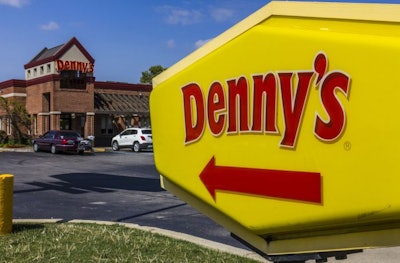
To date, it appears most restaurant chains to adopt policies on broiler welfare have committed to source only chicken from slower-growing broiler breeds that are approved by the Global Animal Partnership (GAP) or the Royal Society for the Prevention of Cruelty to Animals (RSPCA), or both.
But McDonald’s broke that mold in 2017, and Denny’s has now also bucked the trend.
I stumbled upon the animal welfare page of the Denny’s website recently, and found its policy concerning broiler welfare. Here is how it reads:
“Denny’s understands the issues surrounding the welfare of broilers in the supply chain, and stands in support of producer changes to improve the ethical treatment of these animals. By 2025 our goal is to achieve the following improvements as supplier capabilities evolve:
- Denny’s has been a longtime proponent of humane stunning methodologies for all agricultural animals, including but not limited to chickens. We will move toward controlled atmosphere processing utilizing a multi-step controlled atmosphere processing system that induces an irreversible stun.
- Denny’s supports the development of healthier bird strains and will transition to strains of birds that demonstrate higher welfare outcomes.
- Reduce stocking levels, to insure adequate mobility for different live weight grow out targets and prohibit broiler cages.
- Provide environmental enrichments, including litter and lighting improvements in collaboration with responsibly evolving industry views. Specifications will be set forth in applicable vendor contracts, which will allow third party audits.”
Did you notice that the policy only said, “healthier bird strains” and “strains of birds that demonstrate higher welfare outcomes” without mention of GAP or RSPCA?
And neither did the comprehensive broiler welfare policy passed by McDonald’s in 2017, much to the chagrin of animal rights groups pushing the GAP and RSPCA approved breeds.
‘Too prescriptive’
I found the Denny’s policy provocative, particularly since I had just attended a press conference hosted by NSF International while attending the International Production & Processing Expo (IPPE) in Atlanta.
During the press conference, NSF International, which works with corporate customers to help them work out plans to live up to their protein purchase pledges, revealed its new Global Animal Wellness Standards.
During a slide presentation at the press conference, two companies to make broiler welfare pledges were referenced. McDonald’s was one and Nestle was the other. While I already addressed that the McDonald’s pledge didn’t call for GAP or RSPCA standards, but Nestle USA has pledged to source GAP-approved breeds, while Nestle’s European operations will source RSPCA-approved breeds.
So I asked if NSF International advocated for breeds approved by either organization.
Elaine Vanier, DVM, technical manager of NSF International’s Animal Wellness Program, said: “The way we structured it was if we had defined a particular breed requirement, that becomes prescriptive. To be globally applicable, we had to remove that prescriptiveness. In some areas, they may choose to use a breed that would be in alignment with Global Animal Partnership or something else in alignment with certification programs around the world. We did not want to go with that degree of prescriptiveness, because it would not then fit in some of our other markets.”
Impact on the supply chain
With scores of broiler welfare commitments we have seen so far, it will certainly have an impact on the supply chain.
The question we need to ask is that will there be an available supply of GAP approved chicken by the effective dates of the pledges we have seen to date. Only a handful of companies have pledged to produce GAP-certified chicken. If the current lull of pledges discontinues and we begin to again see more pledges of a greater consequence to the supply chain, more producers may need to agree to raise GAP certified chicken in order for those commitments to be fulfilled.
However, most chains making GAP or RSPCA pledges in recent months are smaller, regional chains that aren’t well known outside of their market areas.
To me, Denny’s pledge, like the one before it made by McDonald’s, are more sensible. And it also seems to go in line with Vanier’s words. There may not be a GAP or RSPCA chicken supply available, but that doesn’t mean the chains couldn’t and shouldn’t pledge better welfare for its broiler supply without prescribing one breed over another.


















